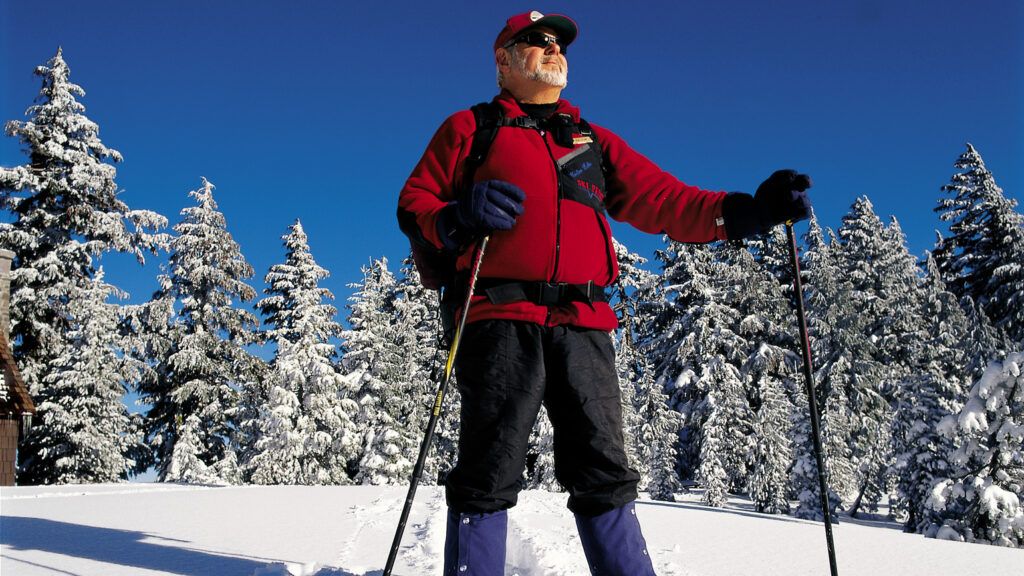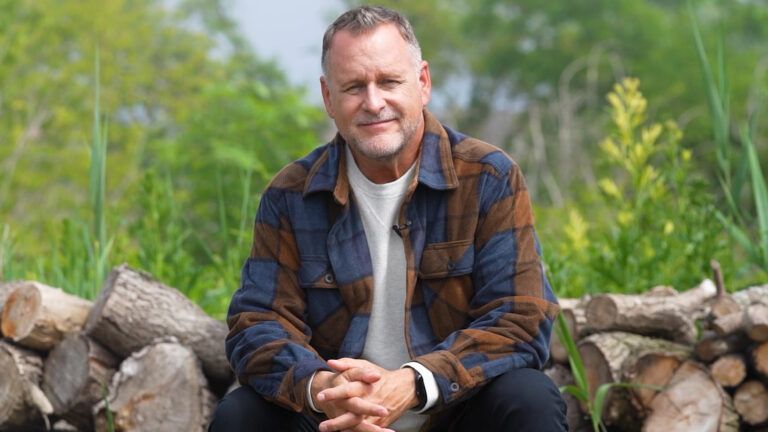I checked my ski boots and took a wary look at the gray, wintry sky. Dime-size snowflakes had been coming down for two days now to the tune of about three feet of fresh powder at Oregon’s Crater Lake National Park. Great for recreational skiers, but those of us on the park’s volunteer ski patrol had to be on alert. Weather like this could mean search-and-rescue operations—everything from lost skiers to trapped avalanche victims. The challenge, as always, was to reach people while they were still alive.
I felt at home in the park. I’d hiked here for 30 years, and was proud to be part of the ski patrol. We’re required to put in a minimum of three weekends a season, but I usually did eight to 10. Call it gratitude. In truth, I had no business being here at all. I’d been shot down over enemy territory while a helicopter gunner in Vietnam—twice. Worse, I drank and used drugs. Addiction took over my life. It poisoned my relationships. It had me helpless, completely at its mercy. As good as dead, really. Then, 14 years ago, I discovered something that changed everything. I’d been living clean and sober ever since, grateful for each new day of life, grateful as a prisoner on death row who had gotten a reprieve.
“Bill!” Randy, a park ranger and patroller, called. “Got a report of a Jeep parked in one of the extended-ski-trip areas. Belongs to a couple whose trip permit says they were going to ski around the lake. They should have been back two days ago.”
Two days. A long time in this cold and snow.
Crater Lake is six miles wide. Circling it is a 33-mile trip, at least. “Let’s go,” I said. We strapped on our cross-country skis, put on our gloves and shouldered our backpacks, loaded with 32 pounds of first-aid supplies and survival equipment. We’d already made sure our radios and avalanche beacons had fresh batteries.
It was 10:14 A.M. when we set out for the trailhead. From there we would make our way to East Rim Road. That was their return route, according to the backcountry permit.
We didn’t see any tracks, only virgin snow. It was up to our knees, too deep and too powdery to ski, so Randy and I had to lift each leg and stomp down to break a trail. Going was slow and tough, and with such a substantial snowfall, we had to keep an eye out—or rather, an ear—for an avalanche. (You can sometimes hear one start, a low sound that seems to come from everywhere.) But breaking trail was also exhilarating. I had skied this area hundreds of times, and never tired of it. Hemlocks and ponderosa pines shot up as high as 200 feet. I felt blessed to be dwarfed by such natural beauty. Again, call it gratitude, but one day at a time I was glad to be alive.
Randy and I took turns doing the exhausting work. We talked to take our minds off our effort. Randy had worked search-and-rescue a lot longer than my six years at Crater Lake. I peppered him with questions. He asked me all sorts of things about Vietnam. I told him my story, even though I wasn’t proud of my past. Too many wasted years. It felt good to talk, though. Especially in the utter backwoods silence. Good to hear how far God had brought me.
“Think those two are okay?” I asked Randy after a while.
“I hope so. But if they got caught in an avalanche, we might not find ’em till spring.”
Two hours we’d been slogging through snow. No sign of the lost skiers. I said a silent prayer for their safety.
At about 12:15 P.M. I heard noise behind us and felt a surge of hope. Randy and I stopped. Two guys skied our way. “Hey, thanks for clearing a path,” one of them called out.
Their names were Kris and Rick. Not the folks we’d been looking for. The guys were experienced skiers and offered to join us in the search. Now there were four of us to break trail. Two miles out, our path rounded sharply north. That’s when I heard it. Whumpf. The snow shook under my feet. Usually that only happened right before a slide or an avalanche.
We stopped. To our left, a rocky outcropping maybe 50 feet high, a smooth face of snow about 300 feet wide and some trees. To our right was the road’s edge and a substantial drop-off. No signs of any fissures or slides in the snow to our left, so we didn’t gear down—loosen our backpacks and bindings and take the ski-pole straps off our wrists—to give us a better chance of surviving an avalanche. Everything looked fine. I took over the lead.
Suddenly Randy yelled, “Here it comes!”
I turned. The snow between the outcropping and the trees broke loose. It moved toward us like a silent wave. I took a step. A flash of white hit me. My feet and skis were instantly covered in snow. I couldn’t move out of the way. My survival training flashed through my mind. Fifteen minutes. That was about the longest a person could survive buried in an avalanche. Take a deep breath. Turn in the direction the slide is heading. See if you can ride down with it.
The snow rose to my waist. All I could manage was to twist my torso. Make an air pocket. I sucked in a lungful of air and got my hands up to my face. A tremendous roar now. Snow engulfed me, wrenching my upper body while my lower body remained firmly in place. I thought I’d be torn in half. The pounding snow forced out the breath I’d taken. I sucked in again. An icy-hot sensation rippled through my chest. I’d gotten snow in my lungs.
Everything came to a stop. My heart hammered. Air. I need air. I’d managed to keep my hands up by my face, but my poles were still strapped to my wrists, like shackles. I could only bend my wrists and move my fingers. The poles anchored my arms so I couldn’t move them. All around me was pitch-black, except straight ahead. There I saw a faint light blue. I clawed at the snow, carving out a small space to breathe. I hacked a few times to get my lungs clear. The snow squeezed me like a vise. I could only get small breaths. And those were coming too fast. Calm down! I told myself. You’ll run out of air.
The radio around my neck squawked. “Avalanche. Four involved.” Randy! “I’m out. Moving to the other three.”
Thank God. Randy got out. He’ll find me. If only I could call him on the radio. Every time I tried to move my arms, I could feel my bones shift, but the flesh around them didn’t budge. It was like being trapped in cement.
Randy kept talking to dispatch. He told them one was buried to his chin and digging himself out. Then he said, “We’re digging out the third.”
What about me? I thought. I’d been under for at least 15 minutes. I couldn’t hear the radio anymore. The patch of blue before me grew fuzzy.
I’m going to die. I was powerless to save myself. But I wasn’t afraid, not like I’d been in Vietnam, or when I was drunk and high. I’d been powerless then too. Sobriety, and the 12 Steps to recovery I’d followed for 14 years, had taught me to accept powerlessness and rely on God’s will. Now, more than ever, I would have to.
I pictured Randy, somewhere up there searching for me. I knew how he felt. Please don’t blame yourself, buddy.
I thought of Carol, my fiancée. I wouldn’t get the chance to say good-bye to her. I love you, Carol, I said in my mind. You’re one of the best things that happened to me. God will watch over you.
I didn’t feel the cold anymore. Instead, I felt peace. So many good things had happened in recovery. I’d gotten my career back, made good friends, found true love. I’d been living on borrowed time. No, not borrowed. A gift. Bonus time. I had been entombed in my addiction as surely as I was entombed in this snow. If I were to die now, I wanted to die thanking God for the life he had given me. New life. As my mind began to fade, I prayed: God grant me the serenity to accept the things I cannot change; the courage to change the things I can; and the wisdom to know the difference.
Blackness. I don’t know for how long. A nudge on my back. Am I dead? Hallucinating? Something jabbed my left elbow. Hard. Sometimes pain is the only thing that lets us know we’re alive. Someone was up there looking for me with a probe.
Just one more time, Lord. Let them poke through again. Something moved close by my left hand. I grabbed on. A ski pole! I yanked it. That pole is not coming out unless I’m attached to it!
Hands broke through the snow and air rushed down. It tasted so sweet. Kris and Rick got me to safe ground and wrapped me in blankets.
“Bill, you were under for forty minutes,” Randy said incredulously. “Forty minutes! How did you … ?” He left his question hanging. Someday we would have another long talk and I would explain it to him then.
I wanted to keep searching, but the park chief ranger ordered both of us to get checked out at the hospital. Later the two lost skiers would be found alive. But right then I headed back toward base, savoring every breath of fresh air as if it were a miracle. I couldn’t wait to see Carol and tell her how much I loved her. How much I loved the life I’d been given again, one day, one minute at a time.
This story first appeared in the March 2004 issue of Guideposts magazine.





